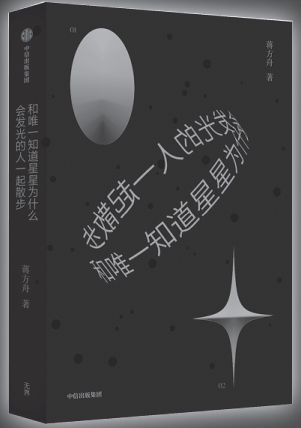 |
|
Author Jiang Fangzhou recently published her new book Promenade With the Only One Who Knows Why Stars Shine that aims to encourage people to walk out of solitude after the pandemic. [Photo provided to China Daily] |
The world changed dramatically in 2020. "People see all kinds of news, however, there is always a sense of estrangement that our imagination cannot catch up with the reality itself, " says writer Jiang Fangzhou. Observing and thinking about people and life amid the pandemic, she says she wants to do something different with her literature.
Jiang, 31, recently published her latest outing Promenade With the Only One Who Knows Why Stars Shine, which consists of four novelettes: Put a Giant Egg by the Sea, Rebuild Time in Venice, A Stranger Came to the Border, and Jiang's favorite one with the same name as the book.
The title of the book came from an anecdote. A scientist went for a walk with his girlfriend. The girl admired the beauty of the night sky. Trying to impress her, the scientist said in reply: "You are walking with the only man in the world who knows why stars shine."
Another writer Li Xiaoxiao says of the book, "We can tell that Jiang Fangzhou must be a science-fiction fan". Romantic, with a taste of science fiction, this book demonstrates Jiang's curiosity and exploration of architecture, physics and astronomy in her writing.
Jiang worked with architects in researching the book and this gave her a sense of structure, order. "I found it a lot of fun working with architects," Jiang says.
Nowadays, people are exposed to literature mostly through films, TV or online dramas. The writer doesn't like TV dramas much, though. She wants to do something fun to let the reader touch literature more engagingly. "The whole process went very well. I write the story, and the architects create their plan at the same time. It's funny to talk about my writing schedule and the placing, say of firefighting devices in the same WeChat group."
Jiang was inspired through her work with architects. She says that literature is the art of time, while architecture is the art of space, and during this process of creation, she found out that her imagination had become richer and more spacious.
Architect Qin Sizhi, also Jiang's friend from senior high school, believes that by combining architecture and literature, a miracle can be made through which the real world is connected to the literary creation full of infinite possibilities.
The story Promenade With the Only One Who Knows Why Stars Shine will be turned into a cultural space in Hubei province next spring called 42 with the theme of galaxy. They named it according to The Hitchhiker's Guide to the Galaxy: "The answer to life, the universe and everything is 42." Coincidently, 42 is also the first two numbers of Hubei ID, where Jiang was born.
In Jiang's eyes, people after the epidemic are all somehow stargazers, lonely, trying to stay away from others, but looking forward to the real beauty of life.
Chinese science-fiction writer Chen Qiufan says that all the heroes or heroines in Jiang's stories, though lonely, were trying hard to build connections with people.
"I hope they can inspire and encourage people to eliminate the alienation caused by the virus." Jiang says.
The German-Swiss author and poet Hermann Hesse once said: "There are many ways in which providence can make us feel lonely and lead us back to ourselves." Of course, the pandemic causes alienation, even between countries. Throughout the lockdown, Jiang couldn't help imagining what if it continues for 5 or 10 years? What will the world be like?
The story demonstrates her thoughts and imagination. Pandemic, war, struggle for power and position, prejudice and discrimination, love and duty. Jiang made up a parallel world set in Eastern Europe of the 1920s-her favorite part of the world because of its sense of melancholy. "I don't want it to be too close to our daily life, so that I made it as vague as possible, and I read a lot in order to speculate logically." Jiang explains.